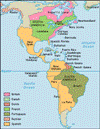Reposting this question: In this post-colonial era, what explains the dramatically different levels of prosperity in nations after they become independent of their colonizing powers?
 Why, for example, has the prosperity of North America been consistently higher than that of Central and South America? Both are rich in natural resources, both involve nations started from scratch, both imported (or had imported) lots of culture from Europe, both have a large ocean buffer between them and the Old World, and so on.
Why, for example, has the prosperity of North America been consistently higher than that of Central and South America? Both are rich in natural resources, both involve nations started from scratch, both imported (or had imported) lots of culture from Europe, both have a large ocean buffer between them and the Old World, and so on.
One major factor is colonial legacies. Colonizing powers bring with them differing economic, political, legal, and cultural institutions. When they leave, the now-independent nations inherit institutional frameworks. For example, they inherit policies, practices, and attitudes in these areas:
* Economics: property rights, contract rights, trade policies, attitudes towards manual work
* Politics: constitutions, democratic and republican practices, degrees of centralization or decentralization of power
* Law: codes of law, jury systems, independent (or not) judges
* Religion: freedom, tolerance, separation (or not) from politics
* Demography: treatment of indigenous populations, policies with respect to slavery, the status of women, openness (or not) to immigration
 I’ve started reading J. H. Elliott’s 2006 Empires of the Atlantic World: Britain and Spain in America 1492-1830 (Yale University Press, 2006). Elliott is vastly read on the subject and he writes with his academic colleagues in mind, and I was struck by this formulation of a big-picture explanatory hypothesis:
I’ve started reading J. H. Elliott’s 2006 Empires of the Atlantic World: Britain and Spain in America 1492-1830 (Yale University Press, 2006). Elliott is vastly read on the subject and he writes with his academic colleagues in mind, and I was struck by this formulation of a big-picture explanatory hypothesis:
Spain’s empire in America was an “empire of conquest” while Britain’s was an “empire of commerce” (p. xv).
Thoughts?
Cool. Sounds about right to me.
However, I think the catholic vs. protestant angle may have been important too.